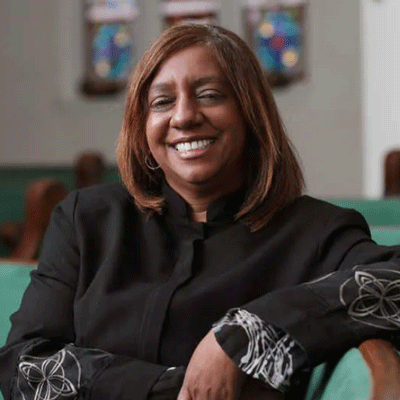Vital Congregations Initiative leader discusses ‘Spirit-inspired worship’
July 17, 2024

The Rev. Veronica Cannon
When it comes to “Spirit-inspired worship,” the Rev. Veronica Cannon sets a very high standard and advises that churches and the people who attend them not compromise.
Cannon admits she can get herself in trouble when she is teaching about this particular mark lifted up through the Vital Congregation Initiative (VCI), because she boldly tells people that if they don’t encounter Jesus Christ when they attend worship, then they may need to move on.
Cannon, who manages the Vital Congregations Initiative for the Presbyterian Church (U.S.A.), spoke to the Rev. Sara Hayden, host of the “New Way” podcast. She told Hayden, who works with the 1001 New Worshiping Communities movement, that she believed that Spirit-inspired worship should convict you of something: “You should be convicted by the Holy Spirit. Something in worship should say, ‘I have got to do better,’” said Cannon. “You should never ever walk out of any worship service the same way you walked in. Something about you should be different.”
Throughout their two-part conversation, Cannon and Hayden cover familiar territory for the seasoned pastor — waking up Sunday morning to a world in trauma and knowing the prepared sermon won’t cut it, responding when someone in worship needs urgent help, striking the balance between “decent and in order” and “Spirit-led,” letting go of the need to control as a leader and relying on others to guide worshipful moments, and helping congregations find the truest expression of their vitality.
“The best sermon is not one that people can hear but one that people see,” said Cannon, who learned this advice from her husband, the Rev. Dr. Jerry L. Cannon, vice president of Ministry Innovation for the Board of Pensions.
Veronica Cannon described how thinking on one’s feet and responding through faith and to the Spirit is its own kind of sermon, for it demonstrates faith in action and a leader’s trust in grace. Hayden shared a vulnerable moment of self-discovery about learning to let go of her plan in leading worshipful experiences and relying on others to connect to the Spirit when the best-laid plans fall through.
“We realize it’s really not about us, anyway,” said Cannon, who admitted that we learn those same lessons over and over “in a difficult and hard way.”
Cannon still pastors First Presbyterian Church in Waxhaw, North Carolina. She brings her experience to her work through the Vital Congregations Initiative: “We are helping churches to become more vital. We are helping pastors to also become revitalized in their work because, you know, being in ministry can be hard. And oftentimes you can feel very much alone,” said Cannon.
Cannon described a theme she hears over and over across churches and presbyteries she visits. People are concerned about how many people stopped attending worship in person during the pandemic and continue to primarily seek out worship online. This has left many pastors and elders concerned about being a transformative presence in their neighborhoods as they also worry about the vital use of their buildings that have become increasingly costly to maintain.
“I’m a pastor at heart,” said Cannon, explaining how she approaches her work as manager of VCI and as a pastor of a small church. She feels compassion for churches as they struggle amid cultural change and in the wave of departures from worship post-Covid. “I’m passionate about this work because part of my ministry is to help people have a vital relationship with Christ,” said Cannon, who applies this ethos to each context of her ministry — from members in her congregation to church leaders in the VCI cohorts or presbyteries that have signed on to support vitality initiatives across their region.
Beth Waltemath, Communications Strategist, Presbyterian Church (U.S.A.)
Today’s Focus: Vital Congregations Initiative
Let us join in prayer for:
PC(USA) Agencies’ Staff
Rhonda Martin, Finance Manager, Presbyterian Women
Dina Martinez, Customer Service Representative, Presbyterian Publishing Corporation
Let us pray
Faithful God, even amid tragedy and suffering, you abide with your people. As you continue to heal our wounds and strengthen our spirits, draw us closer to you and closer to one another, so that all your people may be one. Amen.


